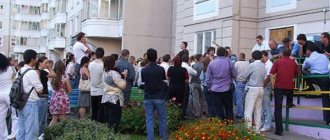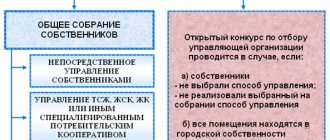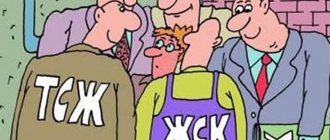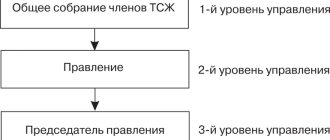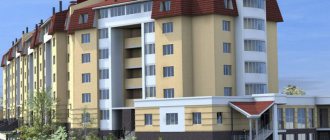Selection criteria, features of home maintenance
Methods for managing apartment buildings are chosen and can be changed or canceled by the owners at a general meeting. The resolution of this meeting is binding on all owners of premises.
The choice in favor of independent property management is explained by the desire of zealous owners to ensure the safety and operational properties of housing longer, saving money on maintenance and life support services.
The legislator allows owners of premises with no more than thirty apartments to use the direct method of managing an apartment building.
The form of management of the house directly by the residents has the features provided for in the articles of the Housing Code, which are as follows:
- contracts for services regarding the maintenance of property belonging to the owners of the entire apartment building and its repair can be concluded only in accordance with decisions made by the general meeting. These are cases when one of the parties to the contract is all owners (a majority of them is acceptable);
- For water supply, sewerage, gas supply, electricity supply, heating, removal of solid municipal waste, the owner of each apartment must conclude contracts on his own behalf.
On behalf of the owners themselves, one of the owners has the right
to conclude contracts This may also be entrusted to another person who does not have property in this apartment building. Such powers are granted by the general meeting and certified in writing: an extract from the resolution of the meeting, issued by the owners with a power of attorney.
Disadvantages of self-management of an apartment building
- With this form of management, residents must understand that all actions related to improving their lives are exclusively voluntary. So, if the residents of the entire house decide to install video intercoms, but several people are against handing over money, they cannot be forced. This means that you will have to operate with the amount that willing residents donate.
- Another significant stone is the representative of “authority” among the residents. It is necessary to choose someone who will take all the work on drawing up documentation and other aspects. This position is unpaid with direct management, while the responsibilities of this position are extensive. It is usually difficult to find such an altruist who will be ready to deal with the problems of an apartment building for days.
- At least 15 families live in each entrance. Each of these families must renew several contracts and pay for utilities according to them. Someone will have to constantly go to apartments and monitor that residents enter into these agreements and regularly pay their bills.
- The most common problem: the quality of services provided by companies. The law does not determine in direct management who will be responsible for this. It is understood that residents themselves must choose suitable companies. But how do you choose what criteria to require? By law, for example, a company is obliged to supply hot water by a certain date. The law has not been broken: hot water is supplied on time. Only for some reason it does not rise to the last floors, and on the penultimate floors it is barely warm. But water supply organizations are not responsible for this. Then who will answer and force the situation to improve?
- The relationship with government support is also getting worse. A house that has been transferred to direct management is considered almost written off from the balance sheet of the municipality, because the residents voluntarily accepted all future and current expenses. Therefore, the possibility of receiving municipal or federal assistance for the implementation of social programs is excluded. That is, a ramp or a playground is needed, residents will implement this with their savings and efforts. Moreover, if some norm is violated during the construction of the structure, everyone will be responsible for the consequences.
- Now there’s another point: document management and reporting. Let's say the meeting decided that the proactive tenant will provide a report on the 5th of the month. But if the tenant does not provide a financial report or is not careful enough in financial matters, who is responsible here?
- Also, the house cannot qualify for funds allocated by the city for current and major repairs. This is limited by law, which states that self-government is deprived of such a right. These costs will also only become a problem for residents who voluntarily agree to such work.
There are many subtleties and pitfalls in the direct management of an apartment building. We have outlined only the most basic points in this material. It is understandable that the owners want to gain independence and the opportunity to have a “transparent” receipt for services. The disorderliness of housing departments and housing and communal services is known to most. People have to waste time proving additions and typos.
MKD Council
According to the Housing Code, in a building where there are more than four apartments and no owners’ association or housing cooperative has been formed, there must be a building council. The composition of this formation and its chairman are chosen by the general meeting. According to the law, there is no need to register the council as a local government institution. It is not allowed to elect one council for several apartment buildings .
All organizational activities for the maintenance and operation of the house, arrangement of the courtyard area, children's playground under the direct management of an apartment building are entrusted to the owners. All possible improvements are carried out in agreement with all owners on a voluntary basis.
A person authorized by the meeting is entrusted with coordinating this work, concluding contracts, maintaining documentation, and preparing reports. Most likely, these duties will be performed by the chairman of the board.
The general meeting or the council of apartment buildings can also elect commissions of owners to assist in the preparation and substantiation of proposals aimed at improving the maintenance of such premises.
Provision of utilities under the direct management of apartment buildings by premises owners
Another important stage, if direct management is carried out by the owners of residential apartments, is the conclusion of resource supply agreements. In particular, this need is regulated by Decree of the Government of the Russian Federation No. 354. This regulatory legal act contains fundamental rules on how and in what volume utilities should be supplied from contractors if an agreement has been concluded with them on behalf of homeowners in the direct management of multi-apartment buildings. buildings.
If there are any interruptions in electricity, gas, or water supply, then it is the utility contractor with whom a formal contract has been concluded on behalf of the homeowners who is responsible for such negligence.
In addition, the Rules for the maintenance of common property in an apartment building, namely in paragraph 42, indicate that persons who are responsible for the supply of utilities and other resources are directly responsible to the homeowners, and if a full supply of a full range of services is not carried out , then the persons will be held accountable to the law of the Russian Federation.
Homeowners in multi-apartment buildings are required to enter into both individual and public contracts when directly managing such premises. In particular, this issue is addressed in Art. 162 Housing Code of the Russian Federation.
It is concluded between two parties to the agreement: the management company or resource supply company and the direct owner of the residential premises. A similar agreement is aimed at ensuring the safety and comfort of living of individuals on the territory of the construction, etc.
The key condition for a public agreement to be concluded by homeowners is the presence of the second party to the agreement in the form of a commercial organization. The definition of what constitutes a public contract is given in the Civil Code of the Russian Federation, namely Art. 426. As for the legislative procedure for drawing up this type of agreement, it is regulated by Art. 445 of the said Code.
Chairman of the board
The legal status of the elected chairman, in addition to managing the activities of the council and reporting to the general meeting on the work carried out, gives him the following duties:
- enter into negotiations on the terms of contracts that will be concluded after the general meeting makes a decision. That is, agreements on repairs and maintenance of commonly used property;
- negotiate with organizations that provide utility services, with which contracts will be concluded personally by each owner who has premises in this apartment building;
- by proxy from apartment owners, enter into contracts, accept services and work. Sign acts on detected violations of standards for services provided and the frequency of their provision;
- monitor the fulfillment of the obligations of the parties under existing agreements; be a representative of owners in court;
The general meeting of apartment owners may establish monetary remuneration for the chairman or other member of the council, determine the amount and procedure for payment.
How to go?
The transition to the direct form is possible for small apartment buildings. An apartment building should have no more than 16 apartments. The formation of a house council as a collective governing body will be necessary if the building has more than 4 apartments.
The transition must be initiated by residents with an active lifestyle. Citizens also organize an initiative group, convince other residents to come to the meeting and vote on the choice of the immediate form. The decision of the meeting must be documented in the form of minutes.
Initiative group
The initiative group should be organized by the residents themselves. The Housing Code of the Russian Federation and by-laws do not regulate the number of people in such a group. In practice, this is usually 5-10 people who are ready to take on the organizational nuances of the meeting and the transition to the immediate group as a whole. The initiative group interacts with residents directly and campaigns for the transition.
Holding a meeting
The date, time and place of the meeting are chosen by the initiative group. Residents must be given proper notice of the upcoming meeting. The agenda is discussed at the meeting.
Residents must:
- vote for the choice of the direct form of management of the apartment building;
- choose a proxy representative for all residents and a house council;
- enter into agreements with utility service providers.
Municipal authorities are notified of the upcoming meeting. Their representatives are also present at the event if the building has apartments belonging to the municipal housing stock.
The meeting is considered to have taken place when at least 50% of the residents voted for the issues voiced on the agenda. The number of votes depends on the area of each residential premises.
Selection of service organization
Contractor candidates are proposed by the head of the meeting. The house does not have a management organization, but there are contractors, resource supply organizations that supply utilities.
They charge a separate fee for repairs and maintenance of utility lines. Contractors are responsible for the quality of services provided to all residents.
Contractors provide services by providing:
- copies of the minutes of the decision of the residents’ meeting to switch to a direct form of management;
- a copy of the minutes of the meeting decision, which confirms the choice of an authorized representative interacting with contractors;
- application for house maintenance by a contractor, the document is issued in the name of the head of the organization;
- notarized powers of attorney.
A contract for the supply of utilities: gas, water, heat, electricity is drawn up with each tenant.
General meeting of MKD owners
Regardless of which method of disposing of the house was chosen, the main management body of the apartment building is considered by law to be the general meeting of apartment owners in such a building. This body resolves literally all organizational issues related to the direct management of an apartment building and its operation.
Legislatively, such an assembly has the right to make its decisions through the following forms:
- in-person voting, when it is required that issues be discussed in the direct presence of premises owners;
- Absentee voting is carried out by poll according to the system: transfer of decisions to the administrator of the meeting in writing. Since 2018, electronic voting has been possible;
- voting in person and in absentia.
A mandatory condition for the competence of decisions taken is a quorum, i.e. participation in voting by more than 50% of owners.
are notified 10 days in advance of such a meeting . At the same time the following are reported:
- information about the initiator of convening the meeting;
- expected form of implementation;
- date, time, place of collection. In the case of absentee (in-person-correspondence) form - address and final date for receiving voting decisions;
- planned agenda;
- How to familiarize yourself with the materials of the upcoming meeting.
Owners of apartments in apartment buildings are required to hold such general meetings annually. Extraordinary - as necessary.
The legislative framework
Direct control is possible thanks to the norms of the Housing Code of the Russian Federation. The minimum list of services and work required to maintain the house in proper condition is approved by Decree of the Government of the Russian Federation of April 3, 2013 No. 290.
The rules for the provision of housing and communal services were approved by Government Decree No. 354 of May 6, 2011.
The procedure for carrying out activities for managing apartment buildings is approved by Decree of the Government of the Russian Federation of May 15, 2013 No. 416.
Decision conditions
The decision was made if the majority of those present voted for it. In some cases, the Housing Code requires that this majority be at least two-thirds of the existing number of premises owners in the apartment building.
When implementing direct management of apartment buildings in new legal conditions, such situations include decisions regarding:
- reconstruction of a house, construction of outbuildings, overhaul of common property, use of the overhaul fund;
- use of the plot of land on which the house is located;
- permission to use common property to persons other than the owners of these premises;
- determination of persons authorized to enter into agreements for the use of common property;
- vesting the MKD council and chairman with the right to make decisions regarding routine repairs of collective property and other issues.
The specified quorum is required to make decisions on the procedure for forming a capital repair fund, establishing minimum contribution amounts and the size of the formed fund, if it is decided to make contribution amounts, create a capital repair fund within limits exceeding the legally established minimum.
An important condition is such a majority of those voting “for” when determining the person who is trusted:
- open a special account, perform transactions on it, select a credit institution to open a special account;
- receive loans, loans for major repairs of common property, have the right to spend funds for these purposes.
All decisions of the meeting must be documented in minutes; they have the status of official documents as local legal acts that entail legal consequences for their implementation.
Benefits of direct management
The legislator indicates the optimal method, limiting the form in which the owners themselves directly manage an apartment building with 30 apartments. Who will undertake to manage a multi-storey, multi-entrance building if not a special management organization, a housing or other cooperative. The residents themselves understand this.
However, within the legally defined framework, direct management of an apartment building seems to be a positive solution . A friendly house team that independently manages multi-apartment housing can receive a number of advantages.
Firstly, even if a decision is made to pay remuneration to the chairman of the MKD board, the costs will be less than when paying for the services of a cooperative or management organization.
Secondly, using this method, concluding on one’s own behalf contracts for the consumption of water, gas, and electrical energy for the owner of each apartment:
- all types of housing payments become transparent;
- individual responsibility comes for timely payments, which reduces the number of debtors;
- issues of maintenance, landscaping, installation of video surveillance are agreed upon with all owners, and a collective opinion is always more rational than an individual one.
Housing law is being improved
New provisions introduced in 2020 simplify some organizational aspects of direct management by the owners of premises in an apartment building.
The main changes make it possible to protect the capital repair fund from inflation. They consist of:
- simplification of the procedure for participation in the general meeting. A citizen, giving another person a power of attorney for the right to vote in his place at a meeting, can certify it at work, at his place of study, without resorting to the paid services of a notary;
- making individual decisions. Previously, the question of where to save money for major repairs (in a general account or a special one) was decided by 2/3, now - more than 50% of the votes from the number of owners of this house;
- the opportunity to open a bank deposit by placing on it funds for major repairs located in a special account of an apartment building. This will protect savings from inflation by accruing higher deposit interest.
So, direct management, within the limits permitted by law, seems to be the optimal form that allows all owners to actively participate in the life of apartment buildings.
Pros and cons of such management
To understand the effectiveness of such management, you need to realistically evaluate all the pros and cons of independence. According to data for 2020, this form of house management is considered one of the most effective, since residents themselves participate in management and enter into contracts with contractors.
The main advantages of such a guide include:
- direct payment for utilities to companies that provide services;
- transparency of payments;
- the presence of debt from one of the owners does not in any way affect the remaining residents;
- rational use of money, since contractors spend funds only on the work specified in the contract;
- Additional services are provided based on funds paid.
Direct house management is highly effective only in cases where residents have an active position . But there are several negative nuances in such a guide.
One of the significant disadvantages is that all management matters are handled by a specific circle of owners, and completely free of charge. Considering how many worries and responsibilities the management of the MKD adds, the gratuitousness of such activities is somewhat unfair.
Moreover, if it is suddenly decided to hire a concierge or improve the yard, then the financial expenses will fall on those who agree. Those who did not agree with these innovations simply may not pay.
Also, houses under direct management are deprived of the opportunity to participate in social programs such as major repairs, updating the playground, etc. And if there are still municipal apartments in the house, then landlords at meetings have the same rights as home owners.

